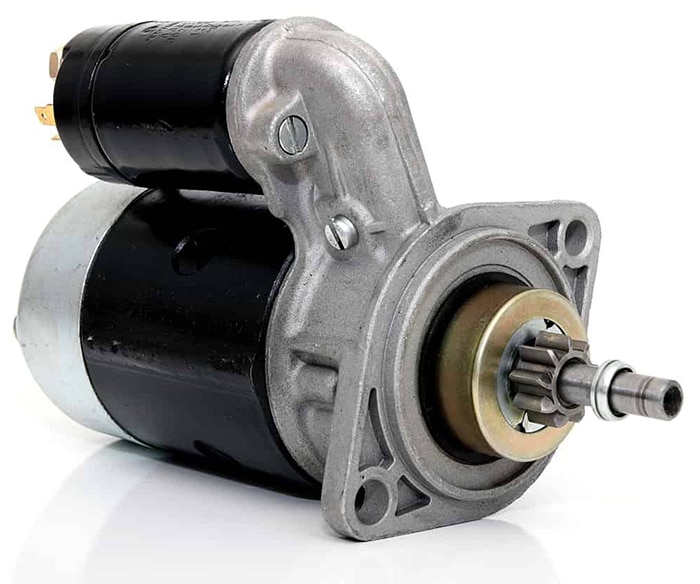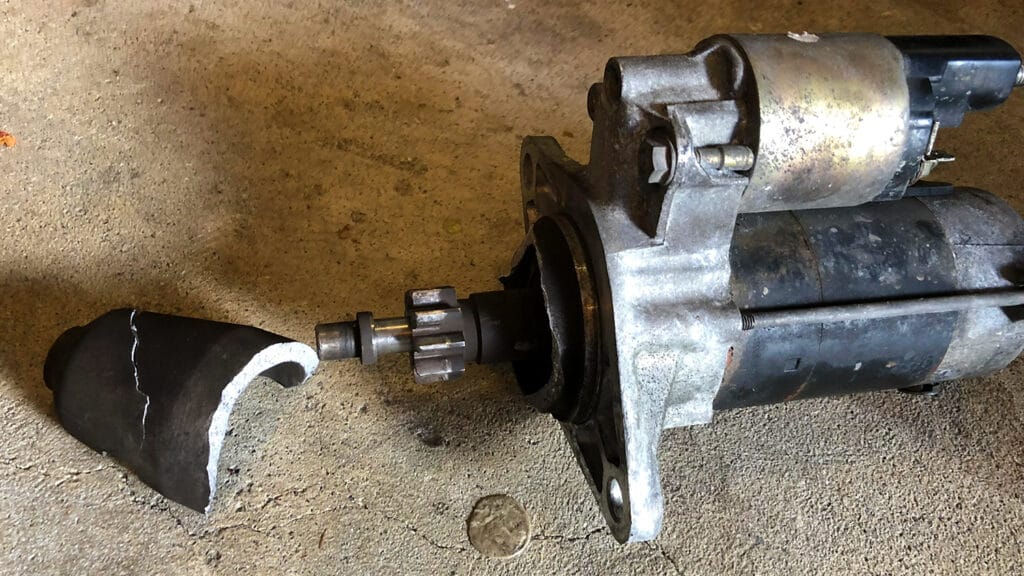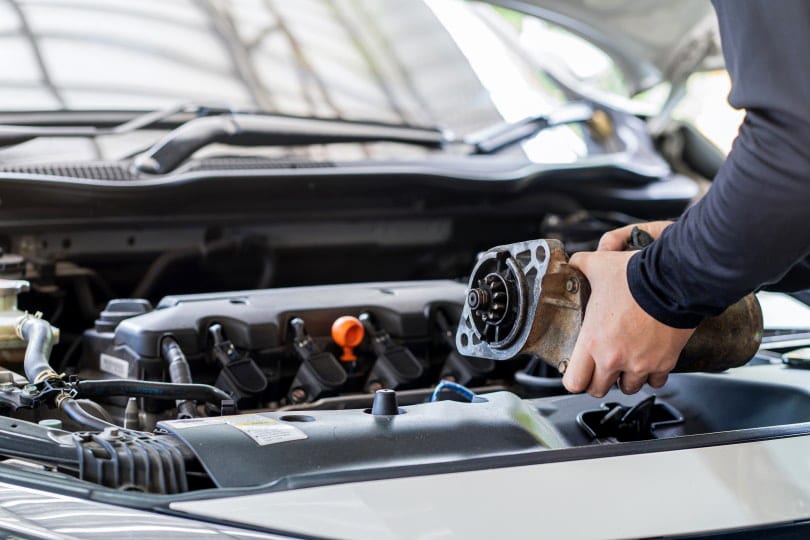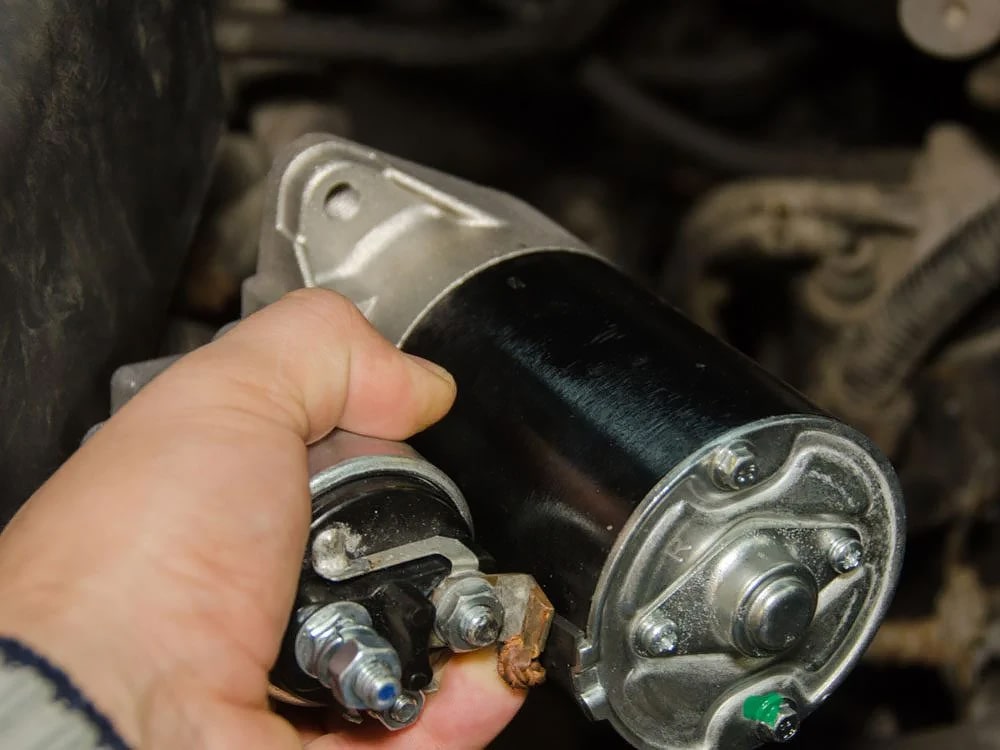It is always stressful when your car refuses to start. It becomes even more stressful when you realize your battery is fine and there is a bigger, more complicated problem at hand. Often this problem is a bad or failing starter motor.
Of course, as with any repair, one of the first questions we ask is “how much will this cost?”, and like any other automotive repair or replacement need, the answer depends on a few things.
For instance, doing it yourself is almost always going to be cheaper than having a professional perform the work, and a starter motor might be significantly cheaper for one make and model versus another.
In this article, we are going to go over starter motor replacement costs along with some tips on how you can do it yourself.
How Much Does It Cost to Replace a Starter?
There is no single answer to how much it costs to replace a starter, unfortunately.
You can expect to pay more at a shop than doing it yourself because you have to pay labor costs, but this still does not give you a solid idea of how much it will amount to.
The price of a new starter motor varies based on the make, model, and year of your car. For example, a new starter for a 1995 Toyota Camry will cost less than what it would for a VR38DETT in an R35 GT-R.

Generally, prices for new starter motors range from under $100 up to $400.
When you own an older car, you might be able to buy a used starter to save some money as well. Salvage yards can be a good resource, although you usually have to pull the parts you need by yourself.
Check with your local yard if you decide to go this route because you will likely need to bring your own tools to remove a starter from one of the junkyard vehicles.
Pro tip: When pulling mechanical or electrical parts from junkyard vehicles, pull them from a totaled car. At least that way you know it was running when it got wrecked. With cars that are perfectly intact, you never know what you’re dealing with.
Another factor in the final cost of starter motor replacement has to do with where you live and where the work is performed.
Dealerships are known to be more expensive on average than independently owned repair shops, and typically services cost more in big cities when compared to smaller towns.
DIY Costs
Replacing your starter motor yourself means you only have to pay for the motor itself, assuming you have the necessary tools on hand.
Although this is the cheaper method; if you are not comfortable working on your car, or simply want to have it done by a professional, then take it to a reputable shop.
It’s a good idea to avoid performing repair work that is outside your skill level as it might turn out to be more expensive in the long run if you accidentally damage other components. Unless you don’t mind the downtime or if it’s a project car.

If you are wanting to do the repair work yourself, expect to buy replacement parts. These will have to be purchased brand new for newer vehicles whereas older vehicles will likely have used options available.
However, if the cost difference is minimal, we recommend just going with the new one to avoid any issues. Additionally, if you can easily afford the cost of a new starter motor, it is best to go with a new one.
As stated earlier, new starter motors can cost anywhere between $100 to $400, so make your decision based on the costs for your particular make and model.
Professional Costs
In automotive shops, labor is normally calculated per hour, and you can expect a starter motor replacement job to take around 1 or 2 hours.
You will most likely pay more if you take your car to a dealership, but this is not universally true.
Often local independent service centers will be able to do the job for less than the dealer will charge you. You can also get quotes from several shops in your area to find the best price.
It is also possible to use your quotes as leverage when talking to other shops, much like how you can present financing terms and out the door prices to different dealers when shopping for a car.
Some shops will revise their pricing to earn your business.

Ultimately, expect to pay anywhere from $300 up to $1,500. While $1,500 sounds steep, remember this is not the average cost, but some starters are simply more expensive and their associated labor costs are also higher.
On average, expect to pay somewhere around $400-$500.
This is all assuming you can get the car to the shop. Also factor in the price to tow your car to a service center if you are unable to drive it there.
Often starter motors fail at inopportune times, leaving you on the side of the road or in a parking lot needing to call a tow truck.
How to Replace a Starter Motor Yourself
If you decide to replace the starter motor yourself, there are general guidelines on how to do it.
The specific starter location will vary by vehicle, of course, so consult your factory service manual for the details.
Factory service manuals can often be found online, and if not, can be purchased. Sometimes other owners have posted guides for your particular make and model, as well.
- Disconnect the battery: Anytime you are working with the electronics of a vehicle, you must disconnect the battery. Loosen and remove the negative terminal. This can be done with a wrench or socket in most cases.
- Jack up your car if needed: Some cars require accessing the starter from below. You only need to perform this step if you cannot access the starter with the car on the ground.
Remember to use jack stands and wheel chocks or a floor jack for maximum safety. Never leave a vehicle on a jack alone, and never go under one until it has been secured on jack stands. - Locate the starter motor: The location will vary by vehicle; if unsure and you do not have a manual handy, try using a mechanic’s work light, or look for diagrams online.
- Disconnect wiring: Your starter motor should have a wire running from the starter solenoid to the fuse box or positive battery terminal.
- Remove the starter motor: To remove the starter, you have to remove the mounting bolts holding it in place. Use a wrench or socket to accomplish this. Depending on how cramped the space is, you might need to use extension bars and/or slim sockets to loosen the bolts.
- Transfer heat shield: If your old starter motor has a heat shield in place, use it for the new motor. This protects the motor from excessive heat.
- Install new starter motor: This is the reverse of starter removal. Mount the starter and insert the bolts. Reconnect the wiring.
- Lower the car to the ground: Remove the jack stand(s) and carefully lower the jack.
- Reconnect negative battery terminal: Be sure the terminal is connected snug to ensure the connection is solid.
- Attempt to start your car’s engine: Provided the sole issue was the starter motor, and it was installed correctly, it should start without trouble.
In Summary

Replacing a starter motor is a job you can do yourself, provided you have the necessary equipment to do so and feel comfortable performing the task.
It will be cheaper to do it yourself in nearly all cases, although it might not be practical to do so.
We say nearly all cases because it might be that a starter motor replacement at a local shop will run you $400, and you have zero tools to do it yourself.
If you need a jack, jack stands, wrenches, ratchets, and sockets, the cost to buy all of that and a new starter motor might exceed that of having it done professionally.
Expect to spend anywhere from under $100 to $400 for a new starter. If you’re on a serious budget, used starters should be cheaper and can be an option. Keep in mind however, that they are generally only available for older model years.
Labor costs from shops will usually add the bulk of the final cost, totaling hundreds of dollars in some cases. You can call around locally to see what kinds of prices are available.
Also remember to factor in extra costs, such as having to tow your car to the shop if you break down somewhere.
You also cannot expect the unexpected, and there might be more needed than just the starter. For example, maybe your starter is bad, but so is the wiring for the solenoid, requiring more labor and parts.
What do you usually pay to get your starter motor replaced? Let us know by leaving a comment below!

